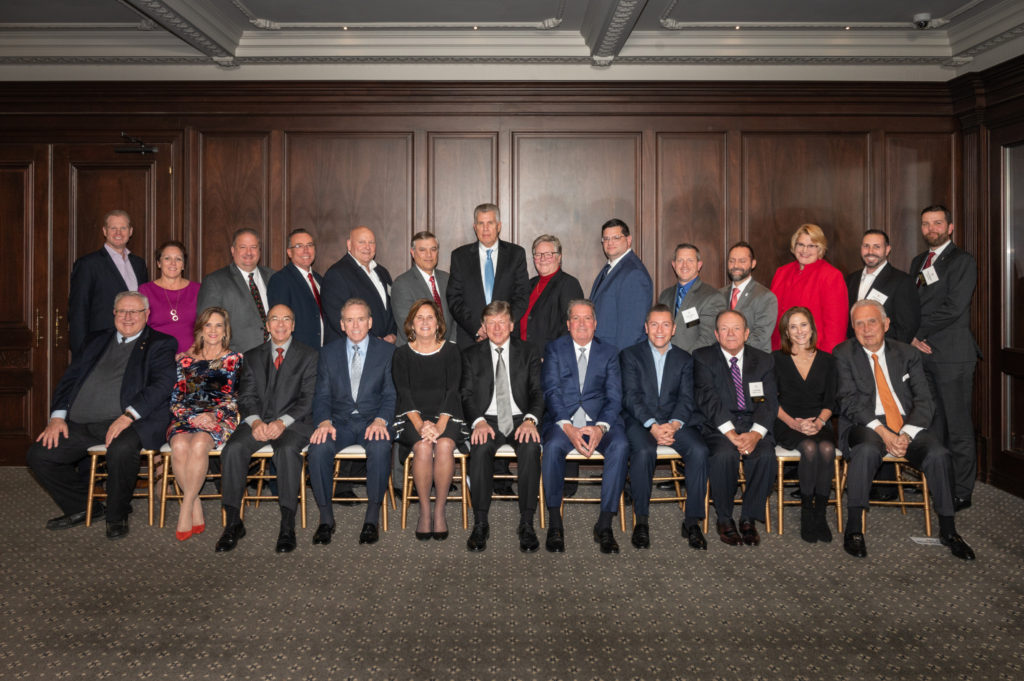NJ Food Council Celebrates 50 Years in 2019!
History
 The New Jersey Food Council (NJFC) was formed in 1969, at a time when the supermarket industry was fractured and did not have a common voice. A small group of New Jersey grocers representing mostly small and independent food stores joined many of the large food retailers with a vision to bring together common goals and strengthen the industry under a unified state association.
The New Jersey Food Council (NJFC) was formed in 1969, at a time when the supermarket industry was fractured and did not have a common voice. A small group of New Jersey grocers representing mostly small and independent food stores joined many of the large food retailers with a vision to bring together common goals and strengthen the industry under a unified state association.
The pioneers of the group recognized the food industry was being adversely affected by often well-intentioned but misguided legislation from Trenton. It is this vision and foresight that gave birth to the Food Council and placed the council on the path to promote and protect the interests of food retailers before state government.
In the 1970’s, the new organization quickly established itself as a major force in Trenton under the leadership of Jay Adelman and immediately designed an aggressive legislative agenda including work on meat packaging requirements, a milk dating system and tax reform.
Membership tripled as food industry representatives joined NJFC to lend their support, offer their expertise and provide vision. During this period the legislative challenges confronting New Jersey retailers included issues like the bottle bill, mandatory item pricing, limitations on store hours, energy crisis regulations, shoplifting, and meat labeling. In the early 1980s, the untimely death of Jay Adelman at the age of 49 stunned the organization.
Former N.J. Assemblywoman Barbara McConnell was selected to serve as the next NJFC president, taking the reins of the association in 1981. For more than 10 years as chief lobbyist, Barbara McConnell and her staff were successful in winning more than 100 legislative and regulatory battles of critical importance to the N.J. grocery industry.
These ten years were most challenging as the Food Council fought and defeated onerous bottle bills, enacted the Clean Communities Act, led the industry into the forefront of recycling, organized a campaign at store level to fight a tax on plastic products, defeated item pricing and battled the Legislature over battery recycling in supermarkets, prescription coupons, and Initiative and Referendum.
In the early 1990s, Barbara McConnell was tapped by former Governor Jim Florio to serve as the first female Commissioner of the state Department of Commerce and Economic Development and Jim Morford was appointed the next NJFC President.
Throughout the 1990s, under the leadership of Jim Morford, the Food Council enjoyed several legislative victories and undertook several key initiatives. NJFC involvement in representing the interest of commercial users during energy restructuring and the highly successful energy aggregation stand out as great achievements.
 Following Jim Morford’s retirement in 2003, Linda Doherty was appointed Food Council President.
Following Jim Morford’s retirement in 2003, Linda Doherty was appointed Food Council President.
During her tenure as President, Ms. Doherty has seen the Food Council champion significant victories including the establishment of “Food to Fuel” promotions, Dry Tare Weights and Measures reform, the development of an Educational Scholarship Program, creation of Food Handlers Training Grant and focus on food desert initiatives. Food industry emergency planning programs enabled NJFC to develop partnerships and best practices that helped members weather Superstorm Sandy by working with public sector resources at the NJ Regional Operations and Intelligence Command Center, the state bunker.
A defining moment for NJFC was the passage of a flawed NJ gift card law that NJFC challenged in federal court. It went all the way to the U.S. Supreme Court and the highest court in the land sided with NJFC and denied the state’s final appeal in 2012.
In 2015, NJFC graduated its first class from the newly minted Leadership Development Program. The program was developed by the Board of Directors to help prepare the next generation of food industry leaders by introducing them to state and federal legislators, regulators and other important government contacts. The program paid immediate dividends for the Food Council with two graduates being named to the Board of Directors and one being named as Vice Chair of the program.
The Food Council continues to lead its members towards innovative solutions to industry issues like Organized Retail Crime (ORC), credit card interchange fees and digital marketing opportunities. As members tackle the complications brought on by the implementation of the Affordable Care Act (ACA) , and the ever changing maze of legislation and regulation from Trenton, NJFC will be by their side to help guide the industry to a more profitable, competitive and rewarding environment.
Despite the many accomplishments of the Food Council over the last 47 years, the mission of the Food Council is never complete as consumer demands, trade partnerships, innovation, legislative trends and business operations are constantly evolving. Trends, technology and business practices widely accepted just years ago are dramatically different today. To remain relevant for the future of the food industry in this region, NJFC must constantly reinvent its purpose, accept change and prepare for an uncertain future.
Dynamic leadership, hard work and vision continue to lead NJFC to significant accomplishments in the 21st Century Marketplace.



 Following Jim Morford’s retirement in 2003, Linda Doherty was appointed Food Council President.
Following Jim Morford’s retirement in 2003, Linda Doherty was appointed Food Council President.